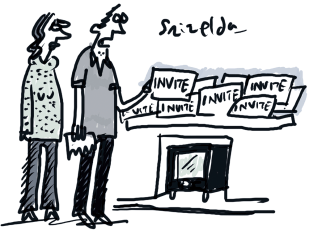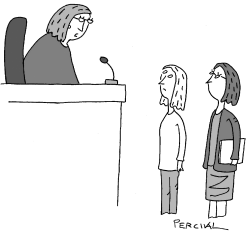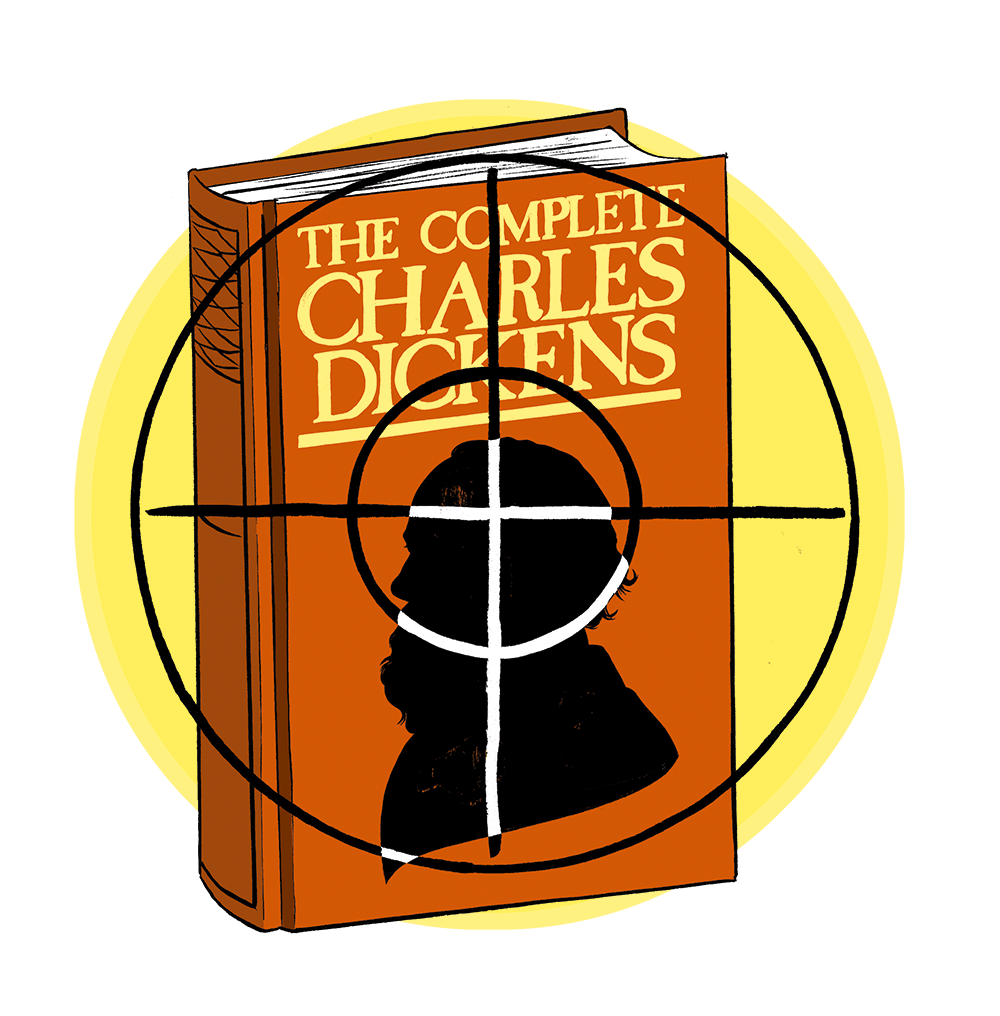
A recent American study, called ‘They Don’t Read Very Well’, analyses the reading comprehension abilities of English literature students at two Midwestern universities. You may be surprised to discover that the title is not ironic. That they don’t read very well is an understatement along the lines of Spike Milligan’s ‘I told you I was ill’.
The study’s subjects were given the first paragraph of Charles Dickens’s Bleak House, and asked to read it out loud, parsing the sentences for meaning. A doddle, you’d think, for anyone reading Eng lit at a university. Well, you’d be wrong. Most participants were unable to elicit a scintilla of sense from Dickens’s prose. It’s as if, dumbfounded, they’d been confronted with Linear B.
This study’s findings feel existential. I can hear the rumblings of disaster, as if the foundations of western culture, eroded for decades, are teetering into collapse.
It won’t happen here, I hear you say. But across Britain, in our educational establishments, teachers gather in corners and murmur. A university colleague tells me that, in a seminar, a student described a Robert Frost poem as gibberish. ‘A mouse could have read it,’ he writes. ‘A small, not especially confident, mouse.’
Study after study points in the same grim direction. Children hardly read; their tech-blinded parents don’t care; their teachers don’t have the resources; and many think that making students read ‘difficult’ books is elitist.
Here, then, is the Dickens passage in question. I’m assuming that Spectator readers will be familiar with it. Otherwise, duck and cover, kids. Your capabilities are about to be strained to the max:
‘LONDON. Michaelmas term lately over, and the Lord Chancellor sitting in Lincoln’s Inn Hall. Implacable November weather. As much mud in the streets, as if the waters had but newly retired from the face of the earth, and it would not be wonderful to meet a Megalosaurus, forty feet long or so, waddling like an elephantine lizard up Holborn Hill. Smoke lowering down from chimney-pots, making a soft black drizzle with flakes of soot in it as big as full-grown snowflakes – gone into mourning, one might imagine, for the death of the sun.’
I can hear the rumblings, as if the foundations of western culture, long eroded, are teetering into collapse
It’s hardly burdensome. It’s nothing like as knotty as a piece of, say, Elizabethan prose. There’s nothing abstract, nothing like a theorist such as Judith Butler spews on to the page, scattering ‘hegemonies’ and ‘rearticulations’ hither and thither. Participants in the study were shown the Dickens unseen, but they were allowed to use phones and dictionaries. And yet, despite the magical resources of 21st-century technology, they stumble, hippopotami on a high wire.
Here is one student’s response (taken straight from the report): ‘I don’t know exactly what “Lord Chancellor” is – some person of authority, so that’s probably what I would go with. “Sitting in Lincoln’s Inn Hall,” which would be like a maybe like a hotel or something so… [Ten-second pause. The student is clicking on her phone and breathing heavily.] OK, so “Michaelmas Term is the first academic term of the year”, so, Lincoln’s Inn Hall is probably not a hotel. [Laughs.] [Sixteen seconds of breathing, chair creaking. Then she whispers:] I’m just gonna skip that.’

This would be risible if it wasn’t so desperately sad. One student thought that ‘Michaelmas Term’ was a character, presumably popping over for a smoothie with his chum Lord Chancellor. (‘Hey Lord!’ ‘How’s it going, Michaelmas!’) Another, reading further into the chapter, believed that a ‘large advocate’ with ‘whiskers’ was a cat, which, to be fair, does lurk in the final syllable of advocate, but even so: that there are students who cannot associate the word ‘whiskers’ with anything that isn’t an animal makes me despair.
American literature students, you might say, can’t be expected to know what ‘Michaelmas Term’ means. Well, ‘can’t be expected to know’ sounds suspiciously like ‘we expect them not to know’. It’s hardly arcane stuff, locked away in an inaccessible monastery available only to the initiated. And they had the internet!
Knowledge, at least, can be gained. What’s worse is that these students can’t read symbolically. Few participants grasped that the Megalosaurus is not, you know, real. I’d expect a ten-year-old to be able to puzzle this out. Remember, too, that these English literature students will most likely teach in schools. Heaven help their pupils.
When adults – who are studying literature, remember – are unable to grasp simple texts like Dickens, when everything is understood only partially or taken at face value, when people delight in or are un-ashamed of what they don’t know, then the consequences are dire. For them, reading and speaking are becoming declarative, their only mode of communication the absolutely literal. Wave goodbye to irony, to nuance, to layers of meaning.
Few participants grasped that the Megalosaurus is not real. I’d expect a ten-year-old to puzzle this out
We can’t pretend that this is normal. I’m not re-running the usual lament about ‘kids these days’. It’s worse than that. A number of factors have been contributing to this downwards spiral. Firstly, the long-term purposeful destruction of our common store of knowledge, stemming from the classics, the Bible and the canon. Secondly, the complicity of the educational establishment in its own collapse, gaily dropping standards for political and financial reasons. Thirdly, the ever-lower expectations that educators and publishers have of children and the resulting decline in their ability to think critically.
Looming over it all are the international techno-entertainment corporations, monetising attention, churning out pabulum, damaging young minds and caring not a jot. And finally I point the finger at a culture that prioritises ‘skills’, safety, comfort and feelings – that promotes the easily digestible and derides the complex.
It wasn’t always like this. When, in the mid-16th century, English education rapidly expanded, being erudite was both a ticket to success and marker of humanity. Grammar schools rigorously inculcated their pupils in Latin. By the age of 11, boys translated Ovid and Terence. Shepherds, shopkeepers, shoemakers; all drank from the wellspring of knowledge.
If you read accounts of early modern literacy, you will marvel. A labourer in Wiltshire read Paradise Lost using a dictionary. A poor shepherd, Thomas Tryon, spent everything he had on education, and later published philosophical tracts. A little girl read the Bible by the age of four. They didn’t do all this to get work, but from love. Where are such autodidacts today? Probably, I’m afraid, playing Fortnite.

The other major problem is that because children aren’t reading as widely and deeply as they used to, then what we give them becomes easier and easier. Puffin Books, the paragon of children’s publishing, recently released cloth-bound editions of its most popular modern titles. While I, as a children’s author, was delighted to see children’s books being awarded such prominence, I have misgivings about one of the chosen books, Jeff Kinney’s Diary of a Wimpy Kid, an American cartoon strip concerning the mishaps of a young boy. Children love it. Of course they do, and why shouldn’t they? It’s funny and relatable. Yet in comprehension terms, its readers are not even in the shallow end. They’re wearing armbands, in a rubber ring, a parent grasping them round the middle. Compare Kinney with, say, Joan Aiken, who expects children to understand what ‘goffering’ is in The Wolves of Willoughby Chase, and mark how things have changed.
‘At least they’re reading!’ coo the parents, teachers and librarians – and Kinney has indeed brought pleasure to millions. The kids are enjoying themselves, connecting with a text, and not gazing dead-eyed at TikTok. Yet I’ve also heard secondary school teachers complaining that children devour Kinney, and then they stop reading. No ladder to the Brontës and Dickens for them. And how soon before even Kinney becomes too taxing? What then? That’s Not My 11+? Spot Does His GCSEs? We’re Going On a Job Hunt?
We need to tell young people again and again: reading is not always about enjoying yourself. It’s not always about connection, or relatability. I no more connect to Achilles than I do to Dorothea in Middlemarch, and yet I still want to read about them, and my life would be poorer without them.
A functioning democracy, a competent bureaucracy, a healthy, competitive market and a thriving arts and literary scene all require citizens capable of sustained, thoughtful reading; of understanding metaphor and allusion; of navigating the gaps between facts; of being a complex adult in a turbulent world. Otherwise, we are in territory primed for conspiracy theories, mis-information and division.
What I don’t understand is why, bar a few standard bearers of excellence, we seem to have given up even trying to do anything about it. I think of Thomas Tryon reading by candlelight, and of his fellow shepherds teaching him to read. I think of that little girl puzzling over her Bible, letter by letter. And then I think of their descendants.
Dust covers the dictionaries; Shakespeare sits untouched; and Dickens is no more than dream and shadow. The silence in the library is dense; the lights, one by one, are going out.








Comments